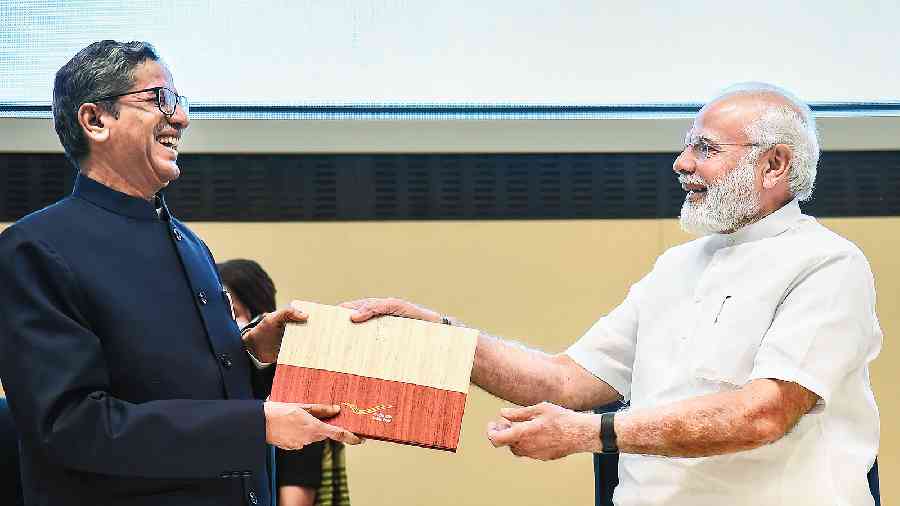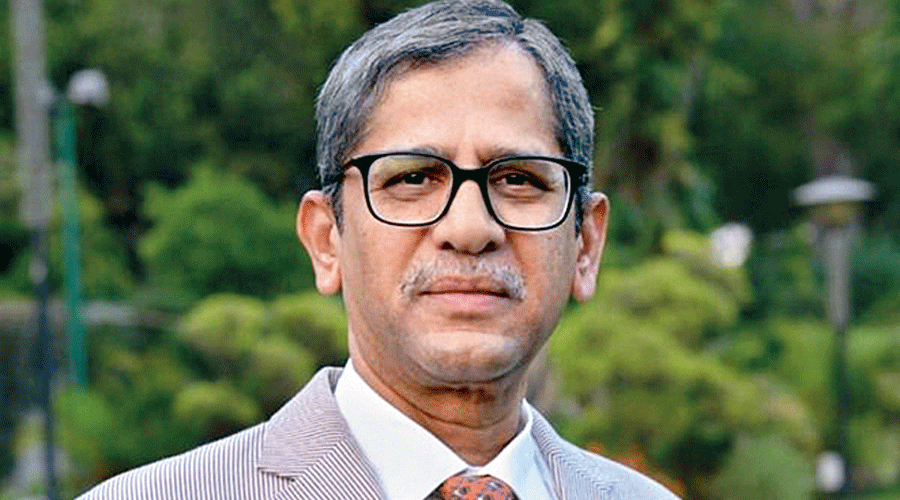Prime Minister Narendra Modi on Saturday underscored the need for quick, economical and easy access to the justice delivery system for the common people, saying “ease of justice” is as important as the government’s pet slogan of “ease of doing business and ease of living”.
He also called for “sensitivity” towards undertrial prisoners, stressing the need to speed up their release.
The Prime Minister flagged these issues while inaugurating the “First All India District Legal Services Authorities Meet”, a two-day event at Vigyan Bhavan here, in the presence of Chief Justice of India N.V. Ramana and some of the senior-most judges in the country, including Justice U.U. Lalit who is scheduled to take over as the next Chief Justice of India on August 27.
Displaying the decorum and civility expected at such gatherings, no one spoke about the elephant in the room.
The Prime Minister was calling for “ease of justice” at a time state governments run by his party have perfected the art of arresting people from other states at the drop of a hat or filing case after case to ensure that bail granted in one case is neutralised and the victim spends weeks, if not months and years, in jail as an undertrial.
Less than a fortnight ago, it took the highest court of the land to remind the Uttar Pradesh government, headed by BJP poster boy Yogi Adityanath, in the Mohammed Zubair case that “it is a settled principle of law that the existence of the power of arrest must be distinguished from the exercise of arrest, and the exercise of the power of arrest must be pursued sparingly”.
Two days earlier, on July 18, the apex court bench had observed that Zubair, the co-founder of fact-checking website AltNews, seemed caught in a “vicious circle” of being subjected to multiple FIRs, and that “the moment he gets bail in one case, he is remanded in another case”.
Zubair was eventually granted bail and released in cases related to tweets, but after he had spent 23 days in custody.
Against such a backdrop, the Prime Minister’s latest slogan — “ease of justice” — had a nice ring.
Several Supreme Court judges, including Justice D.Y. Chandrachud, Union law minister Kiren Rijiju, chief justices of high courts, executive chairpersons of the state legal services and chairpersons of the district legal services were present at the event.
On Saturday, Modi said with his usual flourish: “This is the time for the resolutions that will take the country to new heights in the next 25 years. Like ease of doing business and ease of living, ease of justice is equally important in this Amrit Yatra of the country.”
Referring to Article 39A of the Constitution that exhorts states to provide free legal aid to the needy, Modi said access to the judicial system was important for any society, and judicial infrastructure was an essential ingredient to this.
Calling for “sensitivity” towards undertrial prisoners, he said the district legal services can take up the responsibility of providing legal aid to such prisoners and appealed to district judges (the chairpersons of undertrial review committees) to speed up their release.
Chief Justice of India Ramana regretted that only a small percentage of the population could access justice in the country.
“Justice — social, economic and political — is the vision of justice which our Preamble (to the Constitution) promises to every Indian. The reality is that, today, only a small percentage of our population can approach the justice delivery system when in need,” Justice Ramana said.
“(The) majority of the people suffer in silence, lacking awareness and necessary means. Modern India was built around the goal of removing the disparities in society.
“Project democracy is about providing a space for participation of all. Participation will not be possible without social emancipation. Access to Justice is a tool for social emancipation.”
However, the CJI complimented the role played by the National Legal Services Authority (Nalsa) and the district legal services authorities in providing free legal aid to 70 per cent of India’s population.
“The Legal Services Authorities Act, 1987, was enacted with the objective of reaching the persons at the bottom of the pyramid. The fact that it is aimed at offering free legal aid to 70 per cent of our population makes Nalsa the largest legal aid provider in the world. I am glad that the 27-year-long, noteworthy journey of Nalsa is being captured and celebrated through the commemorative stamp issued by the ministry of communications,” Justice Ramana said.
Expressing satisfaction at the legal services authorities taking up the cause of undertrial prisoners, he said such vulnerable sections also need effective representation before the various judicial forums to access justice.
“We need sincere and dedicated jail-visiting advocates. Jail-visiting advocates can later become the legal-aid-authorised defence counsels. Such advocates must also be accessible to families of the prisoners who are often unaware about their status. Similarly, counsel also must be aware of the conditions and needs of prisoners and must make appropriate and timely applications before the authorities,” the CJI said.
Similarly, the CJI said there was an urgent need to strengthen the ADR (alternative disputes resolution) system through Lok Adalats. Gram Nyayalayas, mediation and arbitration centres, he said, can potentially transform the legal landscape in India by providing millions of people a platform to settle their grievances.
“Matters ranging from matrimonial disputes, inter-governmental disputes, government contracts and land acquisition can be attempted to be resolved through a mandatory ADR. This will not only reduce pendency and backlog, but will also provide much-needed speedy justice to affected parties,” Justice Ramana said.












